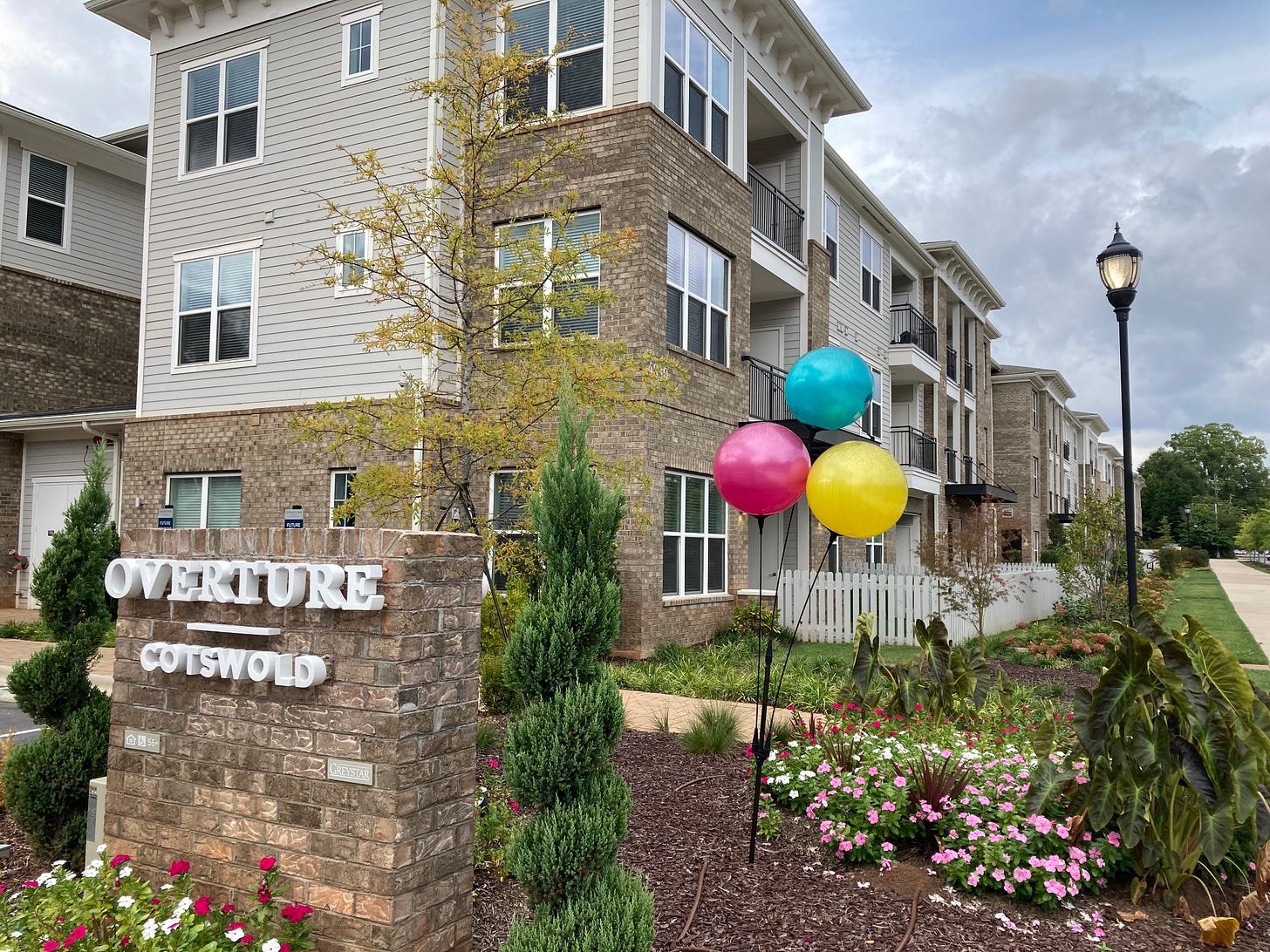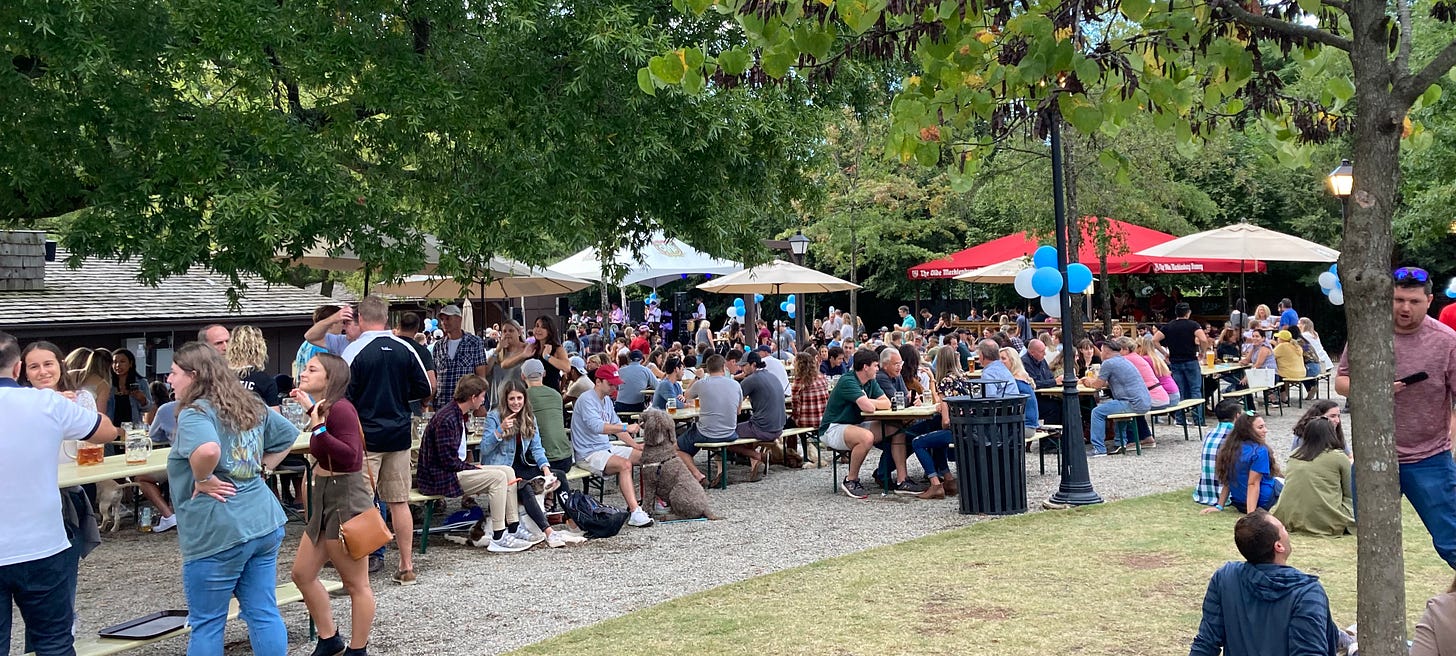Charlotte's 55+ communities are staying active
Plus: Health department backs CMS school plan; BofA to issue 'racial equality' bond; Libraries to allow customers inside starting Wednesday; Reader mailbag; Beer steins out in force in 'LoSo'
Today’s Ledger is sponsored by Providence Day School. Providence Day School exists to inspire in its students a passion for learning, a commitment to personal integrity, and a sense of social responsibility. Virtual admissions open houses are Oct. 29 and Nov. 8.

Urban apartments for ages 55+ gain popularity as parents follow millennials; Socially distanced ‘dorm parties’ on balconies

by Ariana Howard
You might expect that in the middle of a pandemic, residents of Charlotte’s growing number of 55+ communities might be hunkering down or moving out.
But they’re not.
Many sought out 55+ communities to maintain an active life and be surrounded by people their age. Residents have relied on this community during the pandemic, not hidden from it.
At Overture, a 55+ apartment complex in Cotswold, residents often refer to the facility as “Camp Overture” or even a sorority house, because of the high numbers of single women who live in Overture’s rental units.
Bill Riggs, one of the few single men living at Overture’s Cotswold location, joked at his good fortune: “I get to cross this off of my bucket list, living in a sorority house.”
Despite being in a pandemic, Overture residents have managed to continue staying connected to each other. For instance, Overture residents frequently throw what they call “dorm parties” on their balconies in order to keep their distance while remaining social.
New focus on balconies: Balconies have proved to be such an essential aspect of quarantine that Overture’s parent company, Greystar, is rethinking its decision to build new apartment homes with no balconies, says Mitchell Brown, senior managing director of Greystar’s senior housing.
Brown explained that in many ways the active adult rental apartments were inspired by student housing at universities. “Some of us look back to our college days and think, ‘Man that was some of the best years of our lives.’” The main goal of Greystar’s senior housing was “to try to capture that kind of life engagement.”
In addition to balcony parties, residents have stayed active through virtual community events. At the beginning of the pandemic, Overture organized Zoom meetings and created its own YouTube channel, giving residents access to seminars, workshops, concerts, crafts, language classes, a chef series and more.
While many Overture residents picked the community because they wanted to maintain an active lifestyle, some had a compelling reason to move to Charlotte: to be closer to their children and grandchildren. According to Meyers Research, a data provider for residential real estate development and new home construction, 25% of baby boomers plan to retire near their grandchildren.
Following the millennials: Charlotte is one of the top five markets in the country for attracting this “baby chaser” demographic — adults aged 55 and up who move to be closer to their children or grandchildren. The city famously attracts a lot of millennials, who value growing career opportunities and vibrant nightlife. But one of the undertold stories is that their parents are moving here, too.
According to Mecklenburg County’s 2020 Pulse Report, the Charlotte metro area received an average annual net migration of 2,280 seniors age 55+ from 2012-2017. Additionally, as of 2018, adults 65+ accounted for more than 11% of the population in Charlotte, compared with less than 9% in 2010.
This influx of baby boomers has created heightened demand for “senior living” communities in Charlotte. Those options have long existed in suburban communities in the Charlotte region. But now, some of the new communities appealing to the 55+ group are in more urban parts instead of the suburbs.
“They want a lifestyle change,” says Kendalle Carre, Overture’s marketing director. While part of this lifestyle change includes ridding the responsibilities of homeownership, it also entails enjoying the perks of a city. “[Our residents] still want to be involved in every aspect of living.” For that reason, one of the main draws of Overture is that it “has walkability and is close to restaurants.”
Overture offers active adult apartment homes for adults 55+ in both the Cotswold and Rea Farms areas of Charlotte. The average monthly rent at Overture ranges from $2,000-$2,300 — approximately $1,000 above the average monthly rent of a one-bedroom apartment in Charlotte. This rental price points to a rising trend.
According to the New York Times, 20% of baby boomers can afford private continuing care “with many expected to demand a very high standard of living.” Greystar tapped into the active adult living market in 2012 as it saw an unmet demand for a more luxurious and maintenance-free type of senior living.
The value of living in these luxurious senior-living facilities became clear during the pandemic. In March, when the pandemic first hit and residents stayed in their rooms nearly all day, the staff began making care packages for the residents. “We were literally leaving something at their door every day just to keep their spirits up,” said Stephanie Foreman, a lifestyle coordinator at Overture’s Cotswold location. These small gifts included food, health guides, inspirational quotes, trivia games and history pamphlets.
In the last six months, Foreman said, a couple residents have left, but none because of reasons related to Covid.
For many of the residents who have stayed, Overture has been a saving grace, even luxuries aside. Foreman explained: “If they had been anywhere else and couldn’t see their children and grandchildren, they would have been very isolated and alone, where here, they check on each other, they meet, they get groceries together.”
Brown added, “If there is anything that our business is about, it’s about creating strong social networks and purpose.”
“That,” Brown explained, “is more important than ever in Covid.”
Ariana Howard is a freelance journalist and copywriter. She recently graduated from Davidson College with a bachelor’s degree in political science. In previous Ledger articles, she explained the appeal of hard seltzer on college campuses (“How White Claw took over Davidson”) and described the abrupt end to her senior year of college in March (“The last days of Davidson”).
Today’s supporting sponsors are T.R. Lawing Realty…

… and Count on Me CLT. To help save lives, jobs and businesses, please wear a mask, wait 6 feet apart and wash your hands often. Visit CountOnMeCLT.com for more information.

Health department supports return to classroom, Harris says
We read a claim last week that sounded startling — that the county health department recommended against CMS returning students to schools until Mecklenburg’s Covid numbers decline further to acceptable levels.
The Observer’s editorial page, which apparently interviewed board chair Elyse Dashew, wrote:
Dashew said Mecklenburg health director Gibbie Harris recommended to CMS not to bring students back until the county as a whole has satisfied reopening metrics. No individual zip codes have met the threshold yet, a Harris spokesperson told the Editorial Board this week.
Shocking, if true — that the county’s health director thinks the school district is moving too aggressively to reopen schools? As we pointed out last week (🔒), the CMS plan is among the slowest at returning students to classes in the Charlotte region, with high school students not going back until January.
So at a virtual news conference on Friday, The Ledger put the question to Harris. We asked: What exactly did she advise CMS, in public or private? Her reply:
We worked with them on all the metrics. What we provided were the public health metrics. As I mentioned earlier, those metrics are in the yellow zone, which does not restrict the schools from opening again, and as they continue to decrease in our community, support the idea that some in-class instruction is probably a good idea.
As I’ve said before, one metric is not enough to make a decision on. We worked with them on those broad metrics that they have in place [related to school preparation]. The schools continue to look at those. We had some conversations with them this morning, and almost all of those are in the green now. There are a couple they are still gathering information on.
At this point, we are comfortable with the plans the schools have put in place. We’re comfortable with the training they have made available to teachers. As with all of our plans, it’s all about the implementation.
We’re supportive of in-class instruction at some level within our community, and we’ll continue to work with the schools to make sure we are addressing any issues that come up as they move back into the classrooms.
That doesn’t quite clear everything up. Regardless of what you think of their decisions, at least health officials and the school system sound as though they are on the same page. —TM
‘Mecktoberfest’ draws thirsty crowd

Live music, good weather and cold beer brought out the crowds to Olde Mecklenburg Brewery’s “Mecktoberfest” celebration in its biergarten this weekend.
Reader response
It’s time to dip into the ol’ Ledger electronic mailbag, where readers weigh in:
In response to “The downturn’s double whammy against working women” (🔒):
“The story on the pandemic’s impact on women was an important yet sobering one.”
“Thank you for acknowledging this! No one is talking about it, so the tendency is to assume it’s just your husband who is the unhelpful a—hole.”
In response to “He’s blasting Top 40 music on Myers Park’s golf course”:
“How totally immature of Mr. Krug. Does he really believe this will help his case and bring a country club to the negotiating table? As a member of clubs here and in other cities, and having been on many committees and the board of some, I can attest that golf clubs do not make decisions and take actions like this overnight. If you were able to get them to comment, I’m sure club officials would tell you that this landscape plan had been under consideration for months in advance of Mr. Krug deciding to build a pool, and for good reasons of their own.”
“I love what this guy’s doing at Myers Park.”
“I’m feeling David’s pain regarding the music choice. Tell him to try a little Carolina beach music or Motown. It’ll definitely enhance the vibe at the new pool.”
In response to “When downsizing means turning your plants over to science”:
“Yes, plants are work, but they are life. Gardens are my happy place, even though I became disabled last year. If there was a snowball’s chance I could afford his home and greenhouse, I would jump at it. Please, please tell Mr. Mancini that this quote made me cry because I understand it so well: ‘It’s like home,’ he says of being among his plants. ‘It’s comforting. It’s my family. Sometimes I relate to plants better than I relate to people.’”
In response to “Arrow sign backlash in Ballantyne”:
“This is SO trivial. However, nobody had better put an arrow on my house.”
“All the things that are going on in the world, and this is breaking news in Ballantyne?”
In response to “Flyover Friday: Get schooled on UNCC’s growth”:
“I am a Charlotte native, and I am amazed at what I didn’t know/hadn’t seen in our growing city. I’ve been places that I would never have gone and know things/see things for the first time, even though I’ve lived in Charlotte for 76 years. Please continue this great program. I’m still learning, looking and listening.”
In brief:
Prime South End land: A 1.37-acre site beside the RailYard development on South Tryon Street in South End is listed for sale. A flier from Properties South, linked from a website that lists available commercial real estate, says the parcel at Winona and South Tryon streets is on the market for an undisclosed price. It contains an ABC Store and a parking lot, and existing zoning would allow a new building with a height of up to 300 feet.
Libraries reopening: Charlotte Mecklenburg Library says it plans to move into its next phase of reopening on Wednesday and allow customers inside the buildings to browse for materials and use computers. Meeting rooms will remain closed. (Charlotte Mecklenburg Library)
BofA bond: Bank of America says it plans to issue a $2B bond, with the proceeds used to “advance racial equality, economic opportunity and environmental sustainability.” (BusinessWire)
Covenant Day cluster: Six Covid cases among students and teachers have been reported at Covenant Day School in Matthews — the first Covid cluster reported at a Mecklenburg County school. School officials said the grade level where the cluster occurred as well as anyone in close contact with those who tested positive have transitioned to remote learning. (WBTV)
Economic incentives: The City Council tonight is expected to provide a grant of nearly $79,000 to Retirement Clearinghouse, a financial technology company that has said it plans to add 300 jobs in the next five years and invest $4.2M. The state previously committed to providing a $3.3M grant.
New home for ad agency: Wray Ward, Charlotte’s largest ad agency, moves its 107 workers this week into a new office in Wesley Heights, off Freedom Drive in west Charlotte. The Biz Journal says “the office is ready for its debut,” and Charlotte Agenda proclaims that the company “may now have the coolest office in Charlotte” and that the new digs will “give any visitor a serious case of office envy.” (Biz Journal, Agenda)
Iconic sign’s story: The how-they-did-it story behind the restoration of the Park Road Shopping Center sign — one of Charlotte’s most iconic signs — is told in words and pictures in this week’s The Biscuit, the newsletter of Charlotte is Creative. “Being able to touch a sign where most elements were originally manufactured back in the 1950s was great. Seeing and understanding how they made such items without the equipment we have today is incredible.” Crews found a vintage Pepsi bottle inside the sign, which went up in 1956. (The Biscuit)
Correction
Several discerning Ledger readers pointed out that our Saturday newsletter misspelled the name of the TV show “Grey’s Anatomy.” The TV show is spelled with an “E” — “Grey’s.” Obviously, we confused it with the 19th-century medical textbook of the same name, which is spelled with an “A.” Our apologies.

Taking stock
Unless you are a day trader, checking your stocks daily is unhealthy. So how about weekly? How local stocks of note fared last week (through Friday’s close), and year to date:

Need to sign up for this e-newsletter? We offer free and paid subscription plans:
The Charlotte Ledger is an e-newsletter and website publishing timely, informative, and interesting local business-y news and analysis Mondays, Wednesdays, Fridays and Saturdays, except holidays and as noted. We strive for fairness and accuracy and will correct all known errors. The content reflects the independent editorial judgment of The Charlotte Ledger. Any advertising, paid marketing, or sponsored content will be clearly labeled.
Got a news tip? Think we missed something? Drop us a line at editor@cltledger.com and let us know.
Like what we are doing? Feel free to forward this along and to tell a friend.
Searchable archives available at https://charlotteledger.substack.com/archive.
On Facebook, Instagram (@thecharlotteledger), Twitter (@cltledger)
Need an “Essential Charlotte Ledger” T-shirt? Order here.
Executive editor: Tony Mecia; Managing editor: Cristina Bolling; Contributing editor: Tim Whitmire, CXN Advisory; Reporting intern: David Griffith



We are very tired of the propaganda spread by CMS and Gibbie Harris. The schools should have been fully open in September. Teachers wringing their hands about safety are just Karens. Journalists need to call them out. The population they are concerned with have no threat from Covid. This is from the Meckgov website:
Almost all deaths were among older adults (≥ 60 years), 4 deaths occurred in adults ages 20 to 39 and 46 deaths were adults ages 40 to 59.
All deaths, except five, occurred among adults with underlying chronic illnesses.
More than half were non-Hispanic Whites. The disparity in COVID-19 deaths among non-Hispanic Whites is related to differences in race/ethnicity of residents of long-term care (LTC) facilities actively experiencing an outbreak.
More than half of deaths were connected to active outbreaks at long-term care (LTC) facilities.
Among deaths not connected to outbreaks at long-term care facilities, nearly 3 in 4 were non-White, with 40 percent being non-Hispanic Black. As previously noted, these disparities are largely driven by higher rates of underlying chronic conditions that increase risk of severe complications due to COVID-19 infection among these communities.